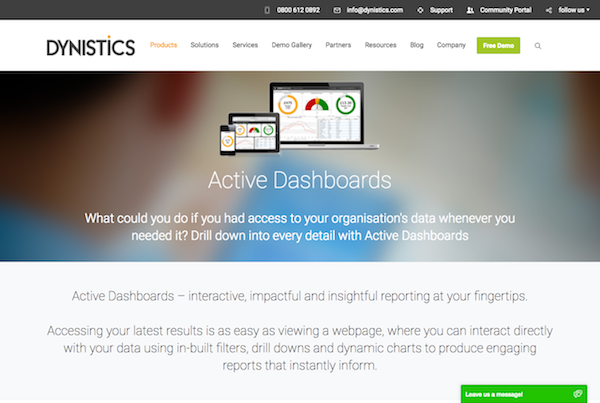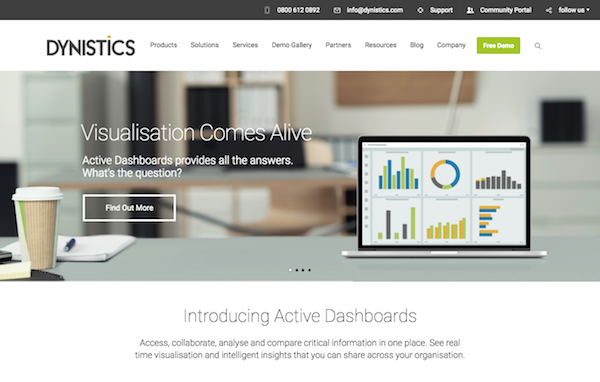Robert Dagge from Dynistics on visualisation to data analytics and dashboard software licensing
 Social Media Portal (SMP): What is your full name and what do you do there for Dynistics?Robert Dagge (RD):
Social Media Portal (SMP): What is your full name and what do you do there for Dynistics?Robert Dagge (RD): My name is Robert Dagge and I'm managing director for Dynistics. I manage the smooth running of the organisation, enabling us to achieve our growth and expansion plans.
SMP: Briefly, tell us about Dynistics what is it and what does company do? RD: Dynistics provides visualisation to data analytics, supporting companies in understanding their business. There are many functional and departmental benefits to doing this and, across our portfolio, we support all aspects of the business. The previous 18 years have enabled us to provide services into 19 different verticals, leveraging expertise and insight gained in one market or function to expedite others.

SMP: When was it founded, how many people work there and how is it funded?RD: Dynistics was founded in 2000. We currently have 14 employees and are set for growth. We are looking to actively increase a number of departments this year to further support existing clients and drive new business. Dynistics is funded by Hearn Capital.
SMP: Who are your target audience and why?RD: Individuals and organisations that seek to understand data in order to grow their business. We have strength and depth in our core vertical markets such as further and higher education, recruitment, professional services and manufacturing, as well as a broader range of clients in our functional offerings for sales and marketing.
SMP: Why do businesses need a dashboard, if vendors already provide this?
RD: Vendors typically will provide dashboards on their own data, occasionally collaborating with other systems and importing one or two data sets. Very few suppliers offer to aggregate all data from across the business, reflecting an all-encompassing view of the organisation.
SMP: Even if consolidated for ease of use, what are the benefits of a dashboard?RD: Dashboards enable clients to have an immediate snapshot across their whole business or into a particular area of the business they need to focus on, through drill-down capabilities. Some organisations will have a group-wide view, while others will use it for specific departments. The one thing they all have in common is that it gives a single view of the truth, instantaneously.
SMP: What are the challenges that you've encountered and how are you overcoming them in what you have been doing so far at Dynistics?
RD: One of the major challenges is that
Active Dashboards is not unique; the business intelligence market, and data visualisation more specifically, continues to expand. When I first joined the company, the underlying technology was fantastic and continues to develop. One thing we have focused on is how we communicate internally and to clients too. This has prompted us to recruit people specifically to focus on this to ensure that we give our clients the best user experience possible.

SMP: What are the high moments of what you have been doing so far?
RD: It's been incredibly rewarding seeing the Dynistics team turn around to become a cohesive unit. This has enabled us to deliver our best ever revenue in 2017 and has set us up for great things in 2018 and beyond.
SMP: What do you see as your biggest challenges and opportunities for your sector and the competition that you have?
RD: There is a significant appetite for the understanding of analytics as well as the application of analytics. Side-by-side these are leading to major shift in the market. Organisations that are slow to adopt or refuse to adopt even basic MI or BI principles are going to significantly lose market share. This doesn't have to be a big investment. There are simple steps that can be taken in order to increase understanding of a business' data.
SMP: What is the most challenging part of building upon your brand presence in digital environments (including social media)?
RD: Particularly in our sector, it can feel like the digital marketing equivalent of David and Goliath. The largest players in our market have expansive marketing teams and budgets. Battling for online space can be difficult without the resource to secure a presence. Smaller companies also have to be really inventive to avoid "me too" marketing. Focusing on niche markets is a way to break the cycle of the biggest, most broadly-known providers being the first port of call; work on your industry expertise and engage in digital conversations on specific market needs.
SMP: What do you think is going to be the most interesting aspect regarding marketing for the next 12 to 18-months and why? RD: Naturally post-GDPR everyone is going to be watching to see which high profile organisation gets fined first. With marketing databases reduced significantly, mass mailers may become a thing of the past and marketers will need to be more creative. The value of data-driven marketing will rise dramatically and this is something we're really excited to see. Granular understanding of campaign successes and areas of improvement will be integral to how the industry will thrive under new conditions.
SMP: What are your top five predictions for marketing for the next 12 to 18-months and why?RD replies with:
- The ICO will issue a fine to a large high-profile organisation for breach of GDPR data compliance to raise awareness.
- Many aspects of data management that were previously within the IT remit will now be the responsibility of marketing.
- Marketing teams will appoint or hire a GDPR compliance officer.
- Cleaner databases full of engaged leads will result more targeted and effective strategy, resulting in higher conversion rates.
- As a result of greater ownership of data and the strategy it will drive, we will see more marketers make CEOs.
SMP: What are your top overall five marketing tips and why?
RD replies with:
- Use your data. Make sure that your whole team know what their KPIs are, both individually and as a whole. Then make sure you are engaging with the data that helps you to evaluate those indicators.
- They say that it is a sign of madness to try the same thing over again expecting different results. Analyse your performance data to avoid wasting valuable resources repeating unsuccessful techniques or campaigns,
- Don't spend less, spend more effectively.
- Look out for new technologies and smaller start-ups that are able to offer something different and won't pass on huge overheads to you.
- Listen to everyone in your organisation; great ideas don't always originate in marketing. Take suggestions on board and build on them.
SMP: Is there anything else we should know, or is there anything that you'd like to share?RD: We use our own product to find out the who, what, where, when, why and how across our own business.
SMP: Best way to contact you and Dynistics?RD: The best way to get in touch would be to email
marketing@dynistics.com.

Now some questions for fun
SMP: What did you have for breakfast / lunch? RD: This morning, I had a coffee and a pain au raisin at my desk (just don't tell my wife!). Lunch is usually something simple like a salmon and cucumber sandwich and a sugar-free drink.
SMP: What's the last good thing that you did for someone? RD: I try to do at least one good deed per day. Small things like helping with a pram, offering a seat on the train or just generally being polite. Manners cost nothing.
SMP: If you weren't working at Dynistics what would you be doing?RD: Working for Air Sea Rescue or as a diving instructor. I love the great outdoors, and I'm happiest up a mountain or under the sea. There is the potential for sporadic bursts of inspiration from either role: seeing something you've never seen before or helping someone out of a situation.
SMP: When / where did you go on your last holiday and why? RD: My last holiday was diving in the Cenotes in Mexico, exploring the underground caves and rivers with my wife and daughter. It was our last family holiday before my daughter started primary school. She had a fantastic time snorkelling and can't wait to get back in the sea and find some fish!
SMP: What's the first thing you do when you get into the office of a morning? RD: Touch base with the London team and catch up with other individuals around the company to see if anyone needs support.
SMP: If you had a superpower what would it be and why?
RD: If I had a superpower it would definitely be time travel. It feels like we're at quite a pivotal part of history at the moment and I would love to be a fly on the wall to observe defining moments from that past. Although I'm a little apprehensive, it would be interesting to see what the future holds too.
You you got an interesting story to tell? Get in touch.